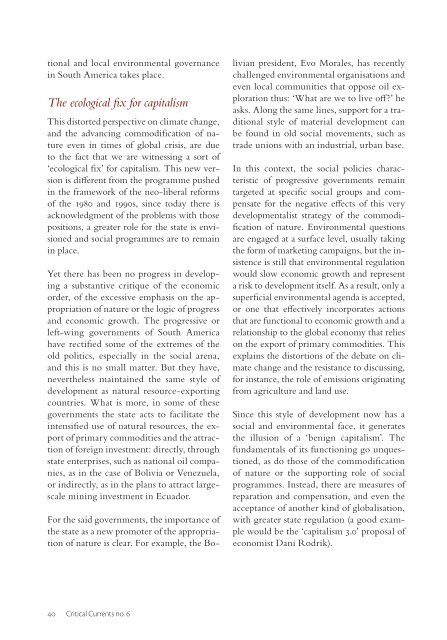Contours of Climate Justice - Dag Hammarskjöld Foundation
Contours of Climate Justice - Dag Hammarskjöld Foundation
Contours of Climate Justice - Dag Hammarskjöld Foundation
Create successful ePaper yourself
Turn your PDF publications into a flip-book with our unique Google optimized e-Paper software.
tional and local environmental governance<br />
in South America takes place.<br />
The ecological fi x for capitalism<br />
This distorted perspective on climate change,<br />
and the advancing commodifi cation <strong>of</strong> nature<br />
even in times <strong>of</strong> global crisis, are due<br />
to the fact that we are witnessing a sort <strong>of</strong><br />
‘ecological fi x’ for capitalism. This new version<br />
is diff erent from the programme pushed<br />
in the framework <strong>of</strong> the neo-liberal reforms<br />
<strong>of</strong> the 1980 and 1990s, since today there is<br />
acknowledgment <strong>of</strong> the problems with those<br />
positions, a greater role for the state is envisioned<br />
and social programmes are to remain<br />
in place.<br />
Yet there has been no progress in developing<br />
a substantive critique <strong>of</strong> the economic<br />
order, <strong>of</strong> the excessive emphasis on the appropriation<br />
<strong>of</strong> nature or the logic <strong>of</strong> progress<br />
and economic growth. The progressive or<br />
left-wing governments <strong>of</strong> South America<br />
have rectifi ed some <strong>of</strong> the extremes <strong>of</strong> the<br />
old politics, especially in the social arena,<br />
and this is no small matter. But they have,<br />
nevertheless maintained the same style <strong>of</strong><br />
development as natural resource-exporting<br />
countries. What is more, in some <strong>of</strong> these<br />
governments the state acts to facilitate the<br />
intensifi ed use <strong>of</strong> natural resources, the export<br />
<strong>of</strong> primary commodities and the attraction<br />
<strong>of</strong> foreign investment: directly, through<br />
state enterprises, such as national oil companies,<br />
as in the case <strong>of</strong> Bolivia or Venezuela,<br />
or indirectly, as in the plans to attract largescale<br />
mining investment in Ecuador.<br />
For the said governments, the importance <strong>of</strong><br />
the state as a new promoter <strong>of</strong> the appropriation<br />
<strong>of</strong> nature is clear. For example, the Bo-<br />
40 Critical Currents no. 6<br />
livian president, Evo Morales, has recently<br />
challenged environmental organisations and<br />
even local communities that oppose oil exploration<br />
thus: ‘What are we to live <strong>of</strong>f ?’ he<br />
asks. Along the same lines, support for a traditional<br />
style <strong>of</strong> material development can<br />
be found in old social movements, such as<br />
trade unions with an industrial, urban base.<br />
In this context, the social policies characteristic<br />
<strong>of</strong> progressive governments remain<br />
targeted at specifi c social groups and compensate<br />
for the negative eff ects <strong>of</strong> this very<br />
developmentalist strategy <strong>of</strong> the commodifi<br />
cation <strong>of</strong> nature. Environmental questions<br />
are engaged at a surface level, usually taking<br />
the form <strong>of</strong> marketing campaigns, but the insistence<br />
is still that environmental regulation<br />
would slow economic growth and represent<br />
a risk to development itself. As a result, only a<br />
superfi cial environmental agenda is accepted,<br />
or one that eff ectively incorporates actions<br />
that are functional to economic growth and a<br />
relationship to the global economy that relies<br />
on the export <strong>of</strong> primary commodities. This<br />
explains the distortions <strong>of</strong> the debate on climate<br />
change and the resistance to discussing,<br />
for instance, the role <strong>of</strong> emissions originating<br />
from agriculture and land use.<br />
Since this style <strong>of</strong> development now has a<br />
social and environmental face, it generates<br />
the illusion <strong>of</strong> a ‘benign capitalism’. The<br />
fundamentals <strong>of</strong> its functioning go unquestioned,<br />
as do those <strong>of</strong> the commodifi cation<br />
<strong>of</strong> nature or the supporting role <strong>of</strong> social<br />
programmes. Instead, there are measures <strong>of</strong><br />
reparation and compensation, and even the<br />
acceptance <strong>of</strong> another kind <strong>of</strong> globalisation,<br />
with greater state regulation (a good example<br />
would be the ‘capitalism 3.0’ proposal <strong>of</strong><br />
economist Dani Rodrik).
















